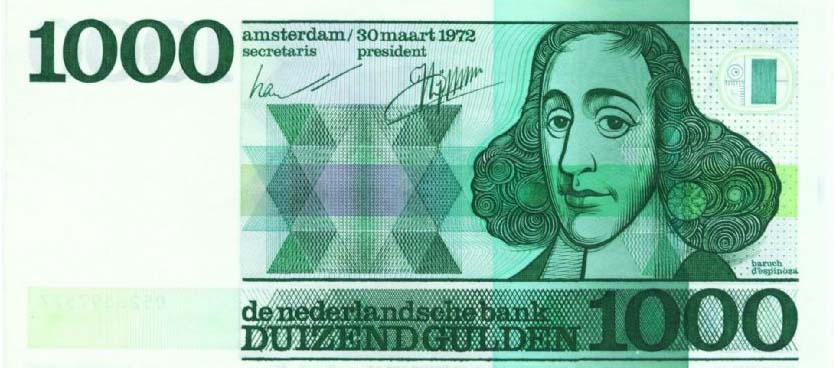 Up to Philosophers in Disgrace and Demand
Up to Philosophers in Disgrace and Demand
 Up to Philosophers in Disgrace and Demand
Up to Philosophers in Disgrace and Demand
|
Benedictus de Spinoza
(banned from the Amsterdam Jewish community, banned from the city of Amsterdam)
Spinoza (1632-1677), member of a Jewish immigrant family in Amsterdam started as a practical man in the trade company of his father. He knew how to talk to persistent debtors, once even was sentenced for physical maltreatment of one of them, an incident in which "the man's hat was stricken off his head".
His type of interest in philosophy and his discussions about this within the Jewish community first led to his expulsion from his ethnic group. He continued to exchange thoughts, as was usual in Amsterdam, among those seeking intellectual pastime in print shops, forming a group of admirers of his views on God as identical to Nature, and his equation of the good with proper scientific understanding and control of the natural forces to which we are exposed in life, leading to an ethics not based in Biblical sources or historical revelation but "proven in the way of geometric".
Though he was quick to understand that his fundamental "geometrical" stance was not suitable for publication and refrained from publishing it in his life time, the ideas he did publish and discuss were threatening enough for the mayor of Amsterdam to grant a request from Jewish circles to ban him from the city of Amsterdam altogether.
Grinding lenses in Rijnsburg, near The Hague, he continued his thinking, until silicosis, a lung disease resulting from glass dust, killed him at 45.
Almost 300 years after his death, in curious analogy to the Roman clerical move after hundreds of years to rebury Galileo in a Church, the Amsterdam commercial elite printed a 1000 Dutch guilder bank-note featuring his face

1000 Guilder bill: Size: 160 x 76 mm; Catalogue Nr.:Mevius-155-1; fixed Date: 30 maart 1972; President: J.Zijlstra; Secretaris: C.T.De Bijll Nachenius; Serienmb-series: 0001-0519 (?)
As Galileo would certainly not have been enthousiastic about the "honour" his reburial in a catholic house of God, Spinoza's writing does cast grave doubt on his appreciation of his post-humous "celebration" on a bank-note that is renowned for its popularity in the 20th century international black money circuit.
Spinoza Ethica: Scholium voor Braadkuikens (in Dutch)